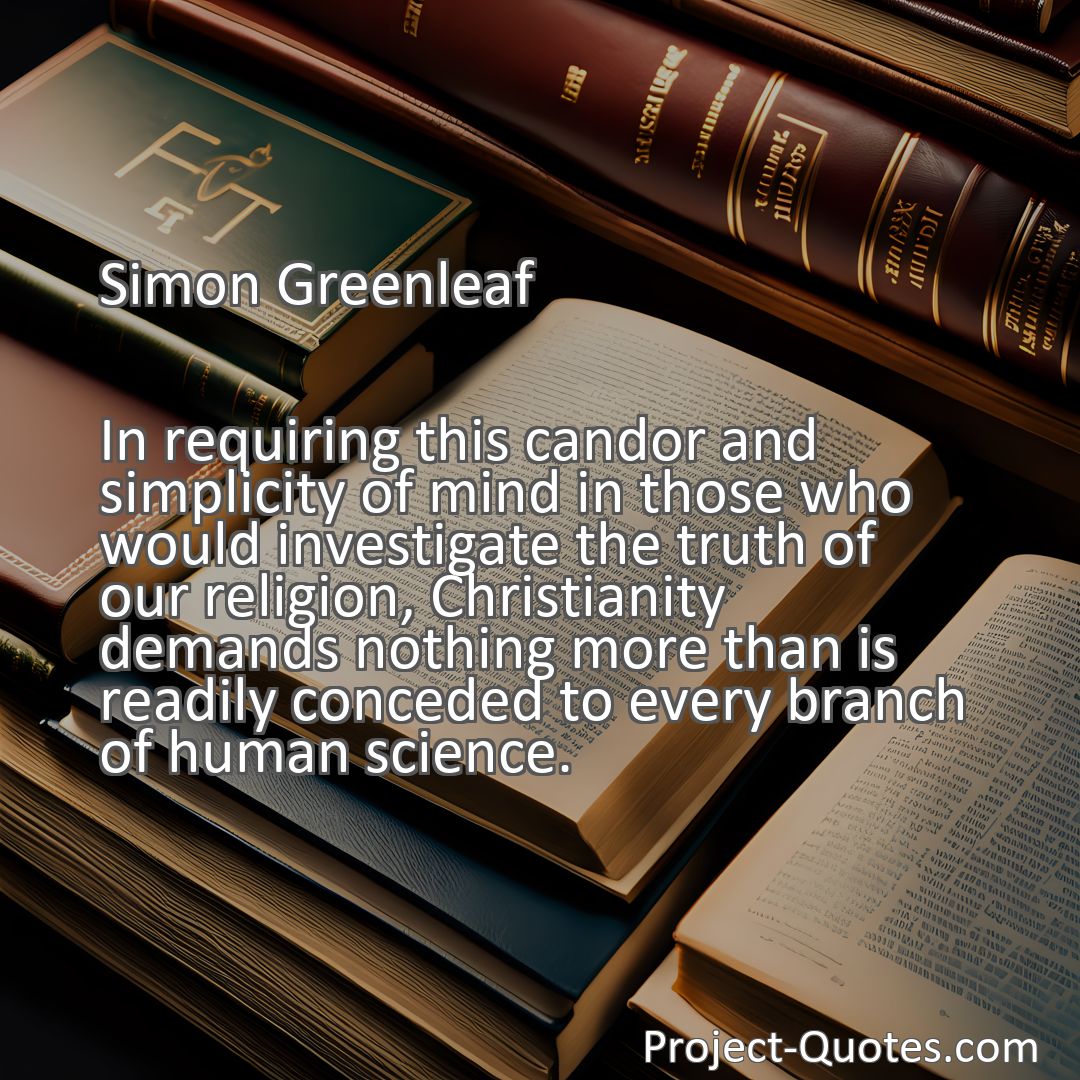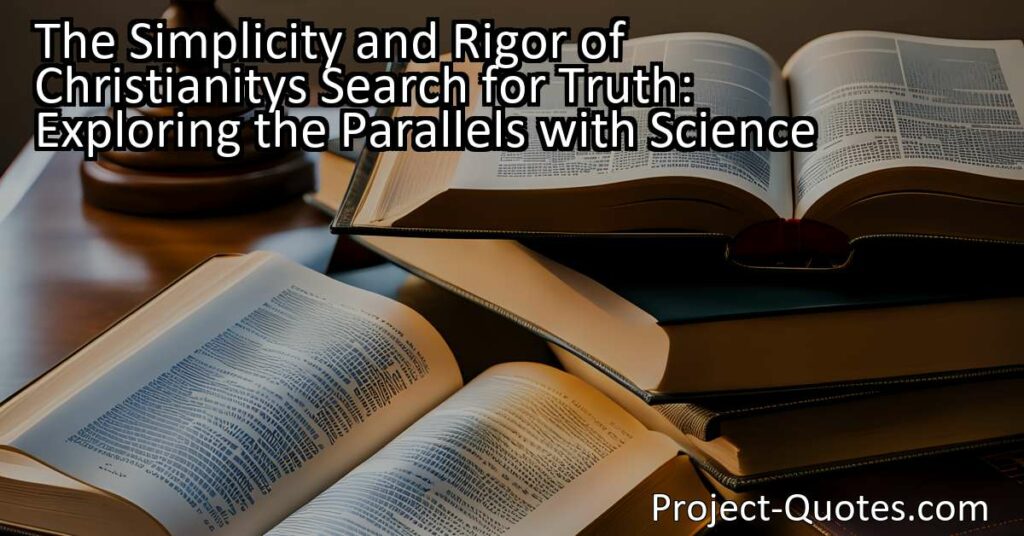In requiring this candor and simplicity of mind in those who would investigate the truth of our religion, Christianity demands nothing more than is readily conceded to every branch of human science.
Simon Greenleaf
Simon Greenleaf, a legal scholar, argued that Christianity requires honesty and simplicity in the search for truth. This parallels the scientific inquiry process, which also demands similar reasoning abilities. By embracing these qualities, individuals can explore religious truth with an open mind and critical thinking, bridging the gap between faith and reason.
Table of Contents
- 1 In requiring this candor and simplicity of mind in those who would investigate the truth of our religion, Christianity demands nothing more than is readily conceded to every branch of human science.
- 2 Simon Greenleaf
- 3 Meaning of Quote – In requiring this candor and simplicity of mind in those who would investigate the truth of our religion, Christianity demands nothing more than is readily conceded to every branch of human science.
- 4 Freely Shareable Quote Image
- 5 Related
Meaning of Quote – In requiring this candor and simplicity of mind in those who would investigate the truth of our religion, Christianity demands nothing more than is readily conceded to every branch of human science.
The Simplicity and Rigor of Christianity’s Search for Truth
Introduction :
Simon Greenleaf, a prominent legal scholar, once asserted that Christianity requires only candor and simplicity of mind from those who seek to investigate its truth. This quote implies that the pursuit of religious truth is comparable to scientific inquiry, both demanding similar reasoning abilities. By exploring the tenets of Greenleaf’s assertion, we can appreciate how honesty, simplicity, and rational thinking are essential not only in religious exploration but also in various academic disciplines.
Understanding Candor and Simplicity :
Candor, or being open and honest in thought and expression, is a necessary element in any inquiry, religious or scientific. It implies a willingness to accept truths that may conflict with preconceived notions. Similarly, simplicity refers to the practice of stripping away unnecessary complexities, allowing the focus to be on essential aspects. In the realm of religion, these qualities enable individuals to approach their exploration with an open mind while being receptive to new perspectives and interpretations. By emphasizing candor and simplicity, Christianity establishes a framework for truth-seeking that is inclusive and respectful of diverse perspectives.
The Parallels Between Religion and Science :
Greenleaf’s assertion that Christianity’s demand for candor and simplicity parallels human sciences highlights the similarities between religious and scientific inquiry. Both disciplines strive to uncover truths about the world, albeit using different tools and methods. In science, hypotheses are formulated and tested through experimentation, while in religion, truth is often found through reflection, inquiry, and spiritual experience. However, the requirement for intellectual honesty remains fundamental to both realms. When investigating religious truths, individuals must approach their studies with the same rigor, skepticism, and critical thinking that are applied in scientific investigations. Consequently, viewing Christianity’s pursuit of truth as akin to human science bridges the gap between faith and reason.
Intellectual Rigor in Scientific Inquiry :
Human science, encompassing disciplines such as biology, physics, and psychology, is characterized by its meticulous and rigorous investigation of phenomena. Researchers strive to account for all possible variables, examining evidence from multiple angles to reach accurate conclusions. This rigorous approach includes a high standard of critical thinking, logical reasoning, and sound judgment. Christianity, as Greenleaf suggests, aligns with this approach, demanding that its adherents employ similar rigor and intellectual integrity when exploring religious truths. By adopting this scientific mindset, individuals can better evaluate the reasonableness and coherence of Christian teachings, examining them critically rather than accepting them blindly. This synergy between scientific inquiry and religious exploration empowers individuals to approach Christianity with both an open heart and a discerning mind.
Applying Science’s Demands of Evidence to Religion :
Science relies on evidence to establish facts and formulate theories, and Christianity, according to Greenleaf, asks a similar standard of its adherents. Just as scientists demand evidence to support their claims, religious seekers are prompted to look for signs and experiences that affirm their faith. While these modes of evidence differ, both science and religion invite us to examine the world for supportive signs. The scientific method encourages rigorous examination, repeatable experiments, and observable phenomena to establish truths. Christianity, on the other hand, invites believers to explore personal experiences, testimonies, and spiritual encounters to affirm their faith. This highlights how both disciplines aim to ground their claims in supportable evidence, even if their methods are distinct. Thus, when investigating religious truth, individuals can employ a scientific mindset, demanding evidence that resonates with their own experiences and aligns with their intellectual understanding.
Examining the Moral and Ethical Aspects :
Understanding the truth in religion, particularly in Christianity, extends beyond purely intellectual exercises. While scientific exploration primarily deals with empirical data and observable phenomena, religion often delves into questions of morality and ethical frameworks. Exploring religious truth requires individuals to consider abstract concepts such as compassion, love, and justice, which cannot be solely explained through empirical measures. This expansion of the pursuit of truth into the realm of moral and ethical values distinguishes religious inquiry from scientific endeavors. Christianity, along with other religions, seeks to provide a comprehensive understanding of the human experience, addressing existential questions that extend beyond the empirical and tangible. Thus, while science investigates the material world, Christianity embraces the complexity of human existence by encompassing moral and ethical aspects in its quest for truth.
Conclusion :
Simon Greenleaf’s assertion that Christianity demands honesty, simplicity, and intellectual rigor in its search for truth invites parallels between religious and scientific inquiry. By valuing candor and simplicity, Christianity fosters an inclusive environment for truth-seeking. Recognizing the similarities between religious exploration and scientific investigation allows individuals to approach their faith with intellectual integrity and critical thinking. Embracing a scientific mindset in religious exploration enables individuals to sift through evidence, introspection, and personal experiences, leading to a deeper understanding of religious truth and its relevance to their lives.
I hope this quote inspired image brings you hope and peace. Share it with someone who needs it today!


